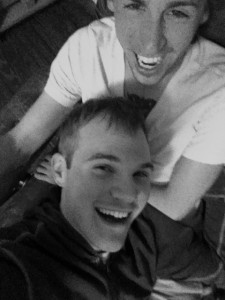Okay, so I already wrote this post once. Then accidentally deleted it in a flurry of excitement surrounding the latest episode of The Walking Dead.
Worse yet, the episode sucked.
The Post Lost Forever was much better, mostly because it was infused with the enthusiasm borne out of a day off work. So forgive this iteration’s jagged edges.
But first, let’s start off with the good news: Daniel Craig isn’t a bigot. Or at least I don’t think so. The bad news? Plenty of his fans definitely are. Well, at least some bubbas.
***
This past Saturday, I wasn’t focused on the movies or James Bond, and I certainly wasn’t contemplating the politics of cinema. With my parents leaving town, and Andy receiving the Parental Seal of Approval with flying colors, we figured a little downtime was in order. And seeing as how movies provide much needed escapist fodder in our post-work day routine, we thought something splashed across the big-screen was appropriate.
Double-plus bonus: it was late. That meant the crotchety seniors were well into bed, and the hormone-high tweens had been picked up in minivans hours ago, taking their overinflated senses of misunderstood selves with them, along with their manic texting, LOLs, and like-cluttered drivel. The theatre closest to our place was a magnet for drunken undergraduates, so we’d be free of them, too.
After driving to the far-flung theatre and paying an exorbitant amount for Sour Jacks and Mike and Ikes, we settled into the unexpectedly crowded theatre.
But I really didn’t think about anything other than the movie, and sharing it with Andy.
And Sour Jacks. Always Sour Jacks.
***
By the time Skyfall started, I’d eaten almost all of our candy, and knew I’d have to sit through a painfully long introduction full of Bond poses, shooting, blood splatter, scantily-clad women, and random explosions.
I wasn’t disappointed.
Before I knew it, Bond had gotten blasted right off the train (Spoiler alert! Or was I supposed to write that before I gave it away? Oh well.), and I halfway expected the 28 Days Later actress responsible for his big fall to be attacked by rage-fueled sacks of flesh as she sat contemplating her unfortunate gunnery.
Meanwhile, Judi Dench made some caustic remarks, because she’s friggin Judi Dench and can do that. And Bond fed a sex-slave’s bodyguard to a komodo dragon, had shower sex, and ventured onto a deserted island resort city—which, coincidentally, Andy had told me about the day before.
A bad dye job later, we were vis-à-vis with Silva. Everyone in the theatre seemed to like his eccentricities.
But the minute it became clear his hands were getting pretty homey with Bond’s inner thighs (a.k.a., the Holy Lands), the audience erupted with expletives, gasps, and slightly muffled epithets.
That’s the moment when Andy and I were ripped off the island and brought crashing back into the overstuffed movie seats—to reality. In such an unexpected way that I thought I was dreaming. But when I shot a glance to Andy, I could tell it wasn’t a dream.
More of a nightmare than anything.
It’s not that I’m afraid of the dark. Just what lurks under its convenient veil. And, in that moment, I thought of the rash of very public shootings and violence earlier this year, and how easily nighttime and a generalized mob mentality can become quick bedfellows.
That’s where I hate to be: the edge—on it, wondering when I’m going to be reminded of my slight difference, and by whom. And I hate the feelings of helplessness associated with that liminal position. Knowing that, if I say anything—go right over the precipice—I’ll be putting more than myself in jeopardy.
So we took it.
In darkness.
In silent solidarity—bonded.
And sat as our movie experience was derailed, unbeknownst to those surrounding us.
***
And then we watched as a victim of the sex trade—having been bound and tortured—was shot in the head.
The response: nothing.
Not even a gasp.
Clearly, the majority of our lovely audience preferred rape, imprisonment, and misogyny over the slightest hints of homoeroticism. (Which reminded me why Romney/Ryan won NC. But I digress.)
And while I’m sure the loudest objecting bubbas pitched tents with every rub of Silva’s hands, I couldn’t help but become more embittered about the double standard LGBTs still face—how any sign of affection is perceived as an explicit display; how every exchange is suspect; how everything we do is thrown before voyeurs, who are afforded the ability to pass legislated judgment on our lives. Who take our lives in their hands and play with them.
Or end them.
Do I care about straight people showing affection? No. Would I have been equally as distressed to see the Bond-Silva exchange transpire with two opposite-sex actors? Yes. The principal elements are Bond’s captivity, and Silva’s insinuations of Bond’s imminent death.
Is there a sexual overtone to the whole scene? Sure. When isn’t there with captivity, regardless of the players’ biological sex?
***
So, as the rest of the movie blurred by, and Skyfall fell into a fiery heap, I focused on the little things.
Like how Bond joked about Silva’s hands, and didn’t care about the villain’s sexual wiring.
Like how he focused on life and living over everything else.
Like how we all get shaken and stirred.
But it’s what’s left that counts.


